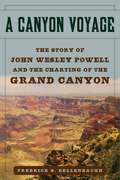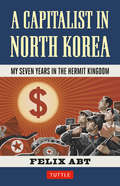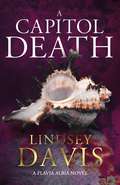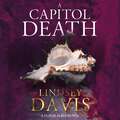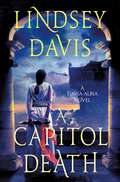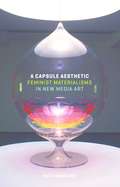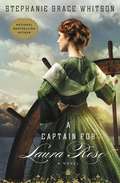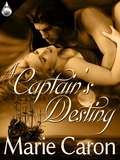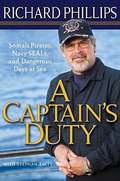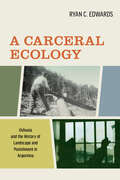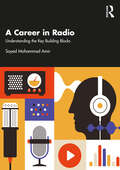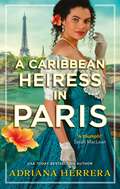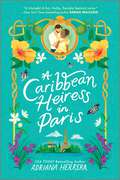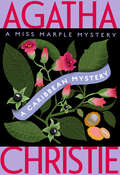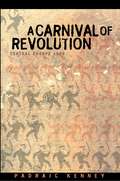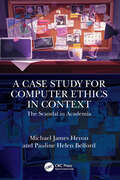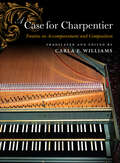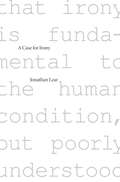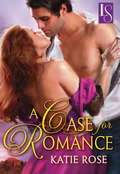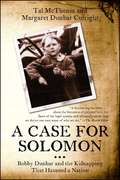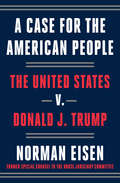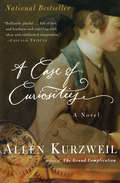- Table View
- List View
A Canyon Voyage: The Story of John Wesley Powell and the Charting of the Grand Canyon
by Frederick DellenbaughIn 1871, seventeen-year-old Frederick Dellenbaugh began a great adventure when he joined Major John Wesley Powell and a crew of scientists on Powell's second exploration trip down the Colorado River and into the Grand Canyon. These were the last great stretches of land and river still unknown in the continental United States. Powell, Dellenbaugh, and the rest of the group spent years exploring the Grand Canyon country, noting its geologic features, and observing its Native Americans inhabitants A Canyon Voyage chronicles this historic expedition, and provides a detailed account of Powell and Dellenbaugh’s historic journey. Through his account the reader can pass through the rapid currents of the Green and Colorado Rivers; climb the crags of the Grand Canyon; trade with the original Native American inhabitants of the Southwest; and witness the picturesque flora and fauna of the area. Brimming with vivid imagery and unbridled adventure, A Canyon Voyage is a perfect read for every armchair adventurer.
A Cap for Mary Ellis: A Novel of Nursing (Mary Ellis #1)
by Hope NewellNegro students outrank others when taking an exam to enter nursing school. Ages 12-14. Follow the journey of integration pioneers. As Mary Ellis enters nursing school as one of the first two Negro students in a previously all white nursing program, follow their blend as students and friends and how everyone learns we have more things in common than we have differences.
A Capitalist in North Korea
by Felix AbtBusiness in North Korea: a paradoxical and fascinating situation is interpreted by a true insider.In 2002, the Swiss power company ABB appointed Felix Abt its country director for North Korea. The Swiss Entrepreneur lived and worked in North Korea for seven years, one of the few foreign businessmen there. After the experience, Abt felt compelled to write A Capitalist in North Korea to describe the multifaceted society he encountered. North Korea, at the time, was heavily sanctioned by the UN, which made it extremely difficult to do business. Yet, he discovered that it was a place where plastic surgery and South Korean TV dramas were wildly popular and where he rarely needed to walk more than a block to grab a quick hamburger. He was closely monitored, and once faced accusations of spying, yet he learned that young North Koreans are hopeful-signing up for business courses in anticipation of a brighter, more open, future. In A Capitalist in North Korea, Abt shares these and many other unusual facts and insights about one of the world's most secretive nations.mes even for weeks if an urgent project needed to be finished." According to your experience, how well do you think the North Korean people would adapt to the capitalistic system?Since the Public Distribution System largely collapsed in the crisis years of the nineties, most people have survived with a host of mostly unofficial private business activities. So they have already gone through a capitalist apprenticeship of sorts. If more reforms accompanied with institution building are carried out even more people will get used to a market economy and to responsible capitalism.In your book, you wrote: "But when people became so keen on getting a USB to watch foreign movies, I stopped offering expensive presents and gave them those tiny electronics." In North Korea, watching foreign movies is strictly banned. However, in your description, the North Korean people appear to freely enjoy foreign culture and materials. What are your thought on the censorship and government control in North Korea?Despite censorship, many people have been watching foreign movies and materials. And they liked USB as these tiny electronics, unlike CDs and DVDs, would not get stuck in a DVD-player or a computer in case of a power cut and an inspection.In your book, you mentioned how you had comparably more opportunities to meet the 'regular people' in North Korea than other foreigners. Did it seem like they actually believe the government-sponsored propaganda? Did they have faith in 'North Korean communism' or 'Juche (self-reliance)' idea? There are still a lot of people believing in North Korea's ideology. On the other hand there has been a strong trend to consumerism particularly among the emerging middle class but also among the children of the elite which would rather embrace Deng Xiaoping's credo: "To get rich is glorious!"You spent substantial amount of time in North Korea and also visited the South as well. What seems to be the major difference between the citizens? What is the task to be tackled in order to reduce the cultural gap between the countries after reunification?When I worked on joint North-South business projects (sand, mining, dairy production, mineral water production on Mount Paekdu etc.) I could feel a strong cultural gap and mistrust. Both sides felt the other side wanted to cheat them, but the misunderstandings had much to do with a lack of knowledge of the other side's thinking and motivations. I as a non-Korean saw myself in a strange position of explaining North Koreans the intentions of South Koreans and vice versa. Unfortunately, this sort of business diplomacy fostering mutual understanding and capacity building came to a complete halt when Lee Myung-bak was elected president.
A Capitol Death
by Lindsey DavisA tragic accident . . . or was it?Emperor Domitian has been awarded (or rather, has demanded) yet another Triumph to celebrate two so-called victories. Preparations are going smoothly until one of the men overseeing arrangements for the celebration accidentally falls to his death from a cliff on the symbolic Capitoline Hill. But Flavia Albia suspects there's more to the incident than meets the eye, as there are plenty of people who would have been delighted to be rid of the overseer. He was an abusive swine who couldn't organise a booze-up in a winery and was caught up in a number of scams, including one surrounding the supply of imperial purple dye and a family of shellfish-boilers. As Flavia finds herself drawn into a theatrical world of carnival floats, musicians, incense and sacrificial beasts, can she see to the heart of the matter and catch those responsible for the unpopular man's untimely death?*************Praise for Lindsey Davis and the Flavia Albia series'Lindsey Davis has seen off all her competitors to become the unassailable market leader in the 'crime in Ancient Rome' genre . . . Davis's squalid, vibrant Rome is as pleasurable as ever' - Guardian'Davis's prose is a lively joy, and Flavia's Rome is sinister and gloriously real' - The Times on Sunday'For fans of crime fiction set in the ancient world, this one is not to be missed' - Booklist'Davis's books crackle with wit and knowledge . . . She has the happy knack of making the reader feel entirely immersed in Rome' - The Times
A Capitol Death (Flavia Albia)
by Lindsey DavisA tragic accident . . . or was it?Emperor Domitian has been awarded (or rather, has demanded) yet another Triumph to celebrate two so-called victories. Preparations are going smoothly until one of the men overseeing arrangements for the celebration accidentally falls to his death from a cliff on the symbolic Capitoline Hill. But Flavia Albia suspects there's more to the incident than meets the eye, as there are plenty of people who would have been delighted to be rid of the overseer. He was an abusive swine who couldn't organise a booze-up in a winery and was caught up in a number of scams, including one surrounding the supply of imperial purple dye and a family of shellfish-boilers. As Flavia finds herself drawn into a theatrical world of carnival floats, musicians, incense and sacrificial beasts, can she see to the heart of the matter and catch those responsible for the unpopular man's untimely death?*************Praise for Lindsey Davis and the Flavia Albia series'Lindsey Davis has seen off all her competitors to become the unassailable market leader in the 'crime in Ancient Rome' genre . . . Davis's squalid, vibrant Rome is as pleasurable as ever' - Guardian'Davis's prose is a lively joy, and Flavia's Rome is sinister and gloriously real' - The Times on Sunday'For fans of crime fiction set in the ancient world, this one is not to be missed' - Booklist'Davis's books crackle with wit and knowledge . . . She has the happy knack of making the reader feel entirely immersed in Rome' - The Times
A Capitol Death (Flavia Albia)
by Lindsey DavisThe next book in the gripping Flavia Albia series, by acclaimed author Lindsey DavisA tragic accident . . . or was it?Emperor Domitian has been awarded (or rather, has demanded) yet another Triumph to celebrate two so-called victories. Preparations are going smoothly until one of the men overseeing arrangements for the celebration accidentally falls to his death from a cliff on the symbolic Capitoline Hill. But an old woman comes forward, insisting that the man was in fact pushed - and she refuses to leave it alone. Tiberius is soon dragged in to find out what really happened, and swiftly passes the job to Flavia Albia. Flavia suspects there's more to the incident than meets the eye, as there are plenty of people who would have been delighted to be rid of the overseer. He was an abusive swine who couldn't organise a booze-up in a winery and was caught up in a number of scams, including one surrounding the supply of imperial purple dye and a family of shellfish-boilers. As Flavia finds herself drawn into a theatrical world of carnival floats, musicians, incense and sacrificial beasts, can she see to the heart of the matter and catch those responsible for the unpopular man's untimely death?*************Praise for Lindsey Davis and the Flavia Albia series'Lindsey Davis has seen off all her competitors to become the unassailable market leader in the 'crime in Ancient Rome' genre . . . Davis's squalid, vibrant Rome is as pleasurable as ever' - Guardian'Davis's prose is a lively joy, and Flavia's Rome is sinister and gloriously real' - The Times on Sunday'For fans of crime fiction set in the ancient world, this one is not to be missed' - Booklist'Davis's books crackle with wit and knowledge . . . She has the happy knack of making the reader feel entirely immersed in Rome' - The Times(P)2019 Hodder & Stoughton Limited
A Capitol Death: A Flavia Albia Novel (Flavia Albia Series #7)
by Lindsey DavisIn Rome, ruled by the erratic Emperor Domitian, Flavia Albia is dragged into the worst sort of investigation—a politically charged murder—in Lindsey Davis’s next historical mystery, A Capitol Death.A man falls to his death from the Tarpeian Rock, which overlooks the Forum in the Capitoline Hill in Ancient Rome. While it looks like a suicide, one witness swears that she saw it happen and that he was pushed. Normally, this would attract very little official notice but this man happened to be in charge of organizing the Imperial Triumphs demanded by the emperor. The Emperor Domitian, autocratic and erratic, has decided that he deserves two Triumphs for his so-called military victories. The Triumphs are both controversial and difficult to stage because of the not-so-victorious circumstances that left them without treasure or captives to be paraded through the streets. Normally, the investigation would be under the auspices of her new(ish) husband but, worried about his stamina following a long recovery, private informer Flavia Albia, daughter of Marcus Didius Falco, steps in. What a mistake that turns out to be. The deceased proves to have been none-too-popular, with far too many others with much to gain from his death. With the date of the Triumphs fast approaching, Flavia Albia must unravel a truly complex case of murder before danger shows up on her own doorstep.
A Capsule Aesthetic: Feminist Materialisms in New Media Art
by Kate MondlochHow new media art informed by feminism yields important and original insights about interacting with technologies In A Capsule Aesthetic, Kate Mondloch examines how new media installation art intervenes in the fields of technoscience and new materialism, showing how three diverse artists—Pipilotti Rist, Patricia Piccinini, and Mariko Mori—contribute to the urgent conversation about everyday technology and the ways it constructs our bodies. A Capsule Aesthetic establishes the unique insights that feminist theory offers to new media art and new materialisms, offering a fuller picture of human–nonhuman relations. In-depth readings of works by Rist, Piccinini, and Mori explore such questions as the role of the contemporary art museum in our experience of media art, how the human is conceived of by biotechnologies, and how installation art can complicate and enrich contemporary science&’s understanding of the brain. With vivid, firsthand descriptions of the artworks, Mondloch takes the reader inside immersive installation pieces, showing how they allow us to inhabit challenging theoretical concepts and nonanthropomorphic perspectives. Striving to think beyond the anthropocentric and fully consider the material world, A Capsule Aesthetic brings new approaches to questions surrounding our technology-saturated culture and its proliferation of human-to-nonhuman interfaces.
A Captain and a Rogue
by Liz TynerBetween the Devil and the deep blue sea Captain Benjamin Forrester's mission is clear: . To Do: Travel to the Greek island of Melos and recover a mysterious statue. . Not To Do: Invoke the wrath of pirates by sailing away in the dead of night without the statue, but with a tempting yet completely forbidden stowaway! Thessa Cherroll desperately needs Ben's help, so with the wind at their back, they set sail for the horizon. But in such close quarters, can either resist the temptations that surface during those long, hot days-and nights-at sea?
A Captain for Laura Rose
by Stephanie Grace WhitsonLaura Rose White's late father taught her everything he knew about piloting a Missouri River steamboat. He even named their boat after her. Despite that, it seems that Laura will forever be a "cub pilot" to her brother Joe, because in 1867, a female riverboat captain is unheard of. That is, until tragedy strikes and Laura must make the two month journey from St. Louis to Fort Benton and back in order to save her family's legacy, her home, and the only life she's ever known. The only way for her to overcome the nearly insurmountable odds is with the help of her brother's disreputable friend Finn MacKnight, a skilled pilot with a terrible reputation. Laura loathes having to accept MacKnight as her co-pilot, especially when she learns she must also provide passage for his two sisters. Straight-laced Fiona has a fear of water, and unpredictable Adele seems much too comfortable with the idea of life in the rough and tumble environment of the untamed river and the men who ply it. Though they are thrown together by necessity, this historic journey may lead Laura and the MacKnights to far more than they ever expected.
A Captain's Destiny
by Marie CaronA roguish sea captain and a lady of privilege. They come from different worlds. But when his life and freedom are threatened, she'll risk it all to save him. Can the love of one woman set a man free and lead him to his future? A spicy, new romance from author Marie Caron, A Captain's Destiny is a passionate story of undying faith and the power of love.Before being accused of a crime he did not commit, Jack O'Bannon, sea captain and handsome rogue, had firmly believed he was the master of his own destiny. But the chain of events that is set in motion will make him question everything--and everyone--he's ever believed in. Will the love of one woman be enough to free him and guide him to his future?Lady Katherine Conlon had led a sheltered life, protected by everyone around her, including a boy in her father's employ. Never did she dream that one day she would return the favor, saving the boy and loving him as only a woman can love a man. But can she overcome the differences between them and take control of her own destiny?Content Notes: Spicy
A Captain's Duty: Somali Pirates, Navy SEALs, and Dangerous Days at Sea
by Richard Phillips Stephan TaltyIt was just another day on the job for Richard Phillips, captain of the Maersk Alabama, the United States-flagged cargo ship that was carrying, among other things, food and agricultural materials for the World Food Program. That all changed when armed Somali pirates boarded the ship. The pirates didn't expect the crew to fight back, nor did they expect Captain Phillips to offer himself as hostage in exchange for the safety of his crew. Thus began the tense five-day standoff that ended in a daring high-seas rescue when U.S. Navy SEALs opened fire and picked off three of the captors. "It never ends like this," Captain Phillips said. And he's right. "A Captain's Duty" tells the life-and-death drama of the career sailor who was held captive on a tiny lifeboat off Somalia's anarchic, gun-plagued shores. A story of adventure and courage it provides the intimate details of this high-seas hostage-taking--the unbearable heat, the death threats, the mock executions, and the escape attempt. When the pirates boarded his ship, Captain Phillips put his experience into action, doing everything he could to safeguard his crew. And when he was held captive by the pirates, he marshaled all his resources to ensure his own survival, withstanding intense physical hardship and an escalating battle of wills. This was it: the moment where training meets instinct, where character is everything. Richard Phillips was ready.
A Carceral Ecology: Ushuaia and the History of Landscape and Punishment in Argentina
by Ryan C. EdwardsCloser to Antarctica than to Buenos Aires, the port town of Ushuaia, Argentina is home to a national park as well as a museum that is housed in the world’s southernmost prison. Ushuaia’s radial panopticon operated as an experimental hybrid penal colony and penitentiary from 1902 to 1947, designed to revolutionize modern prisons globally. A Carceral Ecology offers the first comprehensive study of this notorious prison and its afterlife, documenting how the Patagonian frontier and timber economy became central to ideas about labor, rehabilitation, and resource management. Mining the records of penologists, naturalists, and inmates, Ryan C. Edwards shows how discipline was tied to forest management, but also how inmates gained situated geographical knowledge and reframed debates on the regeneration of the land and the self. Bringing a new imperative to global prison studies, Edwards asks us to rethink the role of the environment in carceral practices as well as the impact of incarceration on the natural world.
A Career in Radio: Understanding the Key Building Blocks
by Sayed Mohammad AmirThis book gives an overview of the development, significance, and impact of radio as a medium of mass communication in modern society. It provides a thorough understanding of the various wings and functionaries of the radio industry. The book also covers aspects of commercial radio, the basics of understanding the pulse of radio listeners, formatting radio programming, making an effective sales pitch and producing great commercials to exhaustive advice on presenting a show, appearing for interviews, and public speaking. It also gives insight into the changes brought in by technology in terms of traditional radio broadcasts, such as digital radio, highlighting its advancements in audio quality and the diversity of programming options available, and satellite radio, subscription-based services, and exclusive access to specialised programming. An outcome of the author’s vast experience of working as a radio jockey and programme manager for over 17 years, his book will be an ideal textbook for undergraduate and postgraduate students of journalism and mass communication, taking courses on radio, audio and podcasting, media production and digital media. Additionally, this book will be an invaluable companion to existing radio professionals as a resource-book for their professional development.
A Caribbean Heiress in Paris
by Adriana Herrera'A Caribbean Heiress in Paris is a triumph!' Sarah MacLean'Historical romance at its very best - fresh, lush and full of steam!' Sophie JordanParis, 1889. Luz Alana Heith-Benzan, heiress to the Caña Brava rum empire, has sailed all the way from Santo Domingo with one purpose: expanding her family's business.Enter James Evanston Sinclair, Earl of Darnick. From their first tempestuous meeting, Luz Alana is conflicted - why is this titled, and infuriatingly charming, Scottish man so willing to help her?Evan might have his own reasons for supporting Luz Alana but every day they spend together makes him yearn for more of her. And with Luz Alana's inheritance dependent on her being married, a marriage of convenience might be the perfect solution.But when Luz Alana set sail to Paris, she came armed with three hundred casks of rum, her two best friends and one simple rule: under no circumstances is she to fall in love . . .Why readers love A Caribbean Heiress in Paris . . . 'Ferociously feminist and sensual, with a dreamily diverse cast. A Caribbean Heiress in Paris is a dazzling historical romance' Helen Hoang'A breath of fresh air featuring everything I love about historical romance' Martha Waters, author of To Love and to Loathe'A lush, vivid romance, highly recommended' Evie Dunmore'A pure delight from start to finish . . . this peek into the glittering world of the Belle Époque will leave you breathless' Joanna Shupe'Lush settings, rich characters, and that familiar feeling of West Indies's allure will steal your heart' Vanessa Riley'An enchanting and unforgettable story' Chanel Cleeton'This book has everything you could want in historical romance' Harper St. George'The historical romance of my dreams' Eva Leigh
A Caribbean Heiress in Paris: A Historical Romance (Las Leonas #1)
by Adriana Herrera"A romp-filled and refreshingly diverse historical romance."—BuzzfeedParis, 1889The Exposition Universelle is underway, drawing merchants from every corner of the globe…including Luz Alana Heith-Benzan, heiress to the Caña Brava rum empire.Luz Alana set sail from Santo Domingo armed with three hundred casks of rum, her two best friends and one simple rule: under no circumstances is she to fall in love. In the City of Lights, she intends to expand the rum business her family built over three generations, but buyers and shippers alike can&’t imagine doing business with a woman…never mind a woman of color. This, paired with being denied access to her inheritance unless she marries, leaves the heiress in a very precarious position.Enter James Evanston Sinclair, Earl of Darnick, who has spent a decade looking for purpose outside of his father&’s dirty money and dirtier dealings. Ignoring his title, he&’s built a whisky brand that&’s his biggest—and only—passion. That is, until he&’s confronted with a Spanish-speaking force of nature who turns his life upside down.From their first tempestuous meeting, Luz Alana is conflicted. Why is this titled—and infuriatingly charming—Scottish man so determined to help her?For Evan, every day with Luz Alana makes him yearn for more than her ardent kisses or the marriage of convenience that might save them both. But Luz Alana sailed for Paris prepared to build her business and her future; what she wasn&’t prepared for was love finding her."Herrera excels at propelling the romance genre and its form forward, and this book is no exception... Herrera is crafting swoony historical romances that aren't afraid to engage with the realities of the 19th-century while still making a bid for hard-earned happily-ever-afters."—Entertainment Weekly Can't get enough of the Las Leonas? Book 1: A Caribbean Heiress in Paris Book 2: An Island Princess Starts a Scandal Book 3: A Tropical Rebel Gets the Duke
A Caribbean Mystery: A Miss Marple Mystery (Miss Marple Mysteries #10)
by Agatha ChristieAs Jane Marple sat basking in the tropical sunshine she felt mildly discontented with life. True, the warmth eased her rheumatism, but here in paradise nothing ever happened. Then a question was put to her by a stranger: 'Would you like to see a picture of a murderer?' Before she has a chance to answer, the man vanishes, only to be found dead the next day. The mysteries abound: Where is the picture? Why is the hotelier prone to nightmares? Why doesn't the most talked-about guest, a reclusive millionaire, ever leave his room? And why is Miss Marple herself fearful for her life? Of note: A Caribbean Mystery introduces the wealthy (and difficult) Mr Jason Rafiel, who will call upon Miss Marple for help in Nemesis (1971) -- after his death.
A Carnival of Revolution: Central Europe 1989
by Professor Padraic KenneyThis is the first history of the revolutions that toppled communism in Europe to look behind the scenes at the grassroots movements that made those revolutions happen. It looks for answers not in the salons of power brokers and famed intellectuals, not in decrepit economies--but in the whirlwind of activity that stirred so crucially, unstoppably, on the street. Melding his experience in Solidarity-era Poland with the sensibility of a historian, Padraic Kenney takes us into the hearts and minds of those revolutionaries across much of Central Europe who have since faded namelessly back into everyday life. This is a riveting story of musicians, artists, and guerrilla theater collectives subverting traditions and state power; a story of youthful social movements emerging in the 1980s in Poland, East Germany, Czechoslovakia, Hungary, and parts of Yugoslavia and the Soviet Union.Kenney argues that these movements were active well before glasnost. Some protested military or environmental policy. Others sought to revive national traditions or to help those at the margins of society. Many crossed forbidden borders to meet their counterparts in neighboring countries. They all conquered fear and apathy to bring people out into the streets. The result was a revolution unlike any other before: nonviolent, exuberant, even light-hearted, but also with a relentless political focus--a revolution that leapt from country to country in the exciting events of 1988 and 1989.A Carnival of Revolution resounds with the atmosphere of those turbulent years: the daring of new movements, the unpredictability of street demonstrations, and the hopes and regrets of the young participants. A vivid photo-essay complements engaging prose to fully capture the drama. Based on over two hundred interviews in twelve countries, and drawing on samizdat and other writings in six languages, this is among the most insightful and compelling accounts ever published of the historical milestone that ushered in our age.
A Case Study for Computer Ethics in Context: The Scandal in Academia
by Michael James Heron Pauline Helen BelfordAimed at addressing the difficulties associated with teaching often abstract elements of technical ethics, this book is an extended fictional case study into the complexities of technology and social structures in complex organizations. Within this case study, an accidental discovery reveals that the algorithms of Professor John Blackbriar are not quite what they were purported to be. Over the course of 14 newspaper articles, a nebula of professional malpractice and ethical compromise is revealed, ultimately destroying the career of a prominent, successful academic.The case study touches on many topics relevant to ethics and professional conduct in computer science, and on the social structures within which computer science functions. Themes range from the growing influence of generative AI to the difficulties in explaining complex technical processes to a general audience, also touching on the environmental consequences of blockchain technology and the disproportionate gender impacts of Coronavirus. Each new revelation in the case study unveils further layers of complexity and compromise, leading to new technical and social issues that need to be addressed.Directly aimed at making ethics in the digital age accessible through the use of real-world examples, this book appeals to computer science students at all levels of the educational system, as well as making an excellent accompaniment to lecturers and course convenors alike.
A Case for Charpentier: Treatise on Accompaniment and Composition (Historical Performance)
by Carla E. WilliamsWho originally authored the anonymous, undated French manuscript Traité d'accompagnement et de composition? Carla E. Williams tackles this mystery while providing the first English translation of this rare manuscript, which resides in the collections of the Lilly Library at Indiana University Bloomington. A Case for Charpentier presents a side-by-side transcription and translation of the treatise along with an introduction that offers historical context. In the manuscript itself, late 17th-century and early 18th-century writers discuss principal musical elements of composition including major and minor modes, the fundamental chords of both modes, dissonances and consonances, meter, tempo, and continuo realization, as well as basse continue. While these writers have not been formally identified, Williams argues that the handwriting of one is that of composer Marc-Antoine Charpentier. By providing a full physical description of the manuscript, along with comparisons of Charpentier's other writings and his handwriting, Williams sheds new light on both the treatise and Charpentier's theoretical writings. With this translation, Williams not only shares invaluable insights into the pedagogical approaches for composition and continuo realization in late 17th-century France but also finally makes Traité d'accompagnement et de composition available to a broader audience.
A Case for Irony (The Tanner lectures on human values #13)
by Jonathan LearIn 2001, Vanity Fair declared that the Age of Irony was over. Joan Didion has lamented that the United States in the era of Barack Obama has become an "irony-free zone." Jonathan Lear in his 2006 book Radical Hope looked into America’s heart to ask how might we dispose ourselves if we came to feel our way of life was coming to an end. Here, he mobilizes a squad of philosophers and a psychoanalyst to once again forge a radical way forward, by arguing that no genuinely human life is possible without irony. Becoming human should not be taken for granted, Lear writes. It is something we accomplish, something we get the hang of, and like Kierkegaard and Plato, Lear claims that irony is one of the essential tools we use to do this. For Lear and the participants in his Socratic dialogue, irony is not about being cool and detached like a player in a Woody Allen film. That, as Johannes Climacus, one of Kierkegaard’s pseudonymous authors, puts it, “is something only assistant professors assume.” Instead, it is a renewed commitment to living seriously, to experiencing every disruption that shakes us out of our habitual ways of tuning out of life, with all its vicissitudes. While many over the centuries have argued differently, Lear claims that our feelings and desires tend toward order, a structure that irony shakes us into seeing. Lear’s exchanges with his interlocutors strengthen his claims, while his experiences as a practicing psychoanalyst bring an emotionally gripping dimension to what is at stake—the psychic costs and benefits of living with irony.
A Case for Romance
by Katie RoseWith a delightful wit and a delicious talent for the unexpected, Katie Rose tells a sensuous tale of the wicked, wild West and the proper Bostonian there to solve a murder--only to become embroiled in romance. This isn't the fate Emily Potter imagined for her long-lost father: gunned down in cold blood in the parlor of his bordello in bawdy, booming Denver. Now the lovely armchair sleuth from the civilized East is determined to unmask the killer, employing the logic of her hero, Sherlock Holmes. Yet Holmes never faced distractions like the Reverend Thomas Hall, who seems unusually interested in the abandoned house of sin--and Emily's every move. Emily suspects the "preacher" knows more about gunslingers than the Good Book--and perhaps even something about her father's murder. All she knows is it's hard to keep her mind on deduction when Thomas seems intent on seduction. Meanwhile the bordello's matchmaking ghost insists on providing lessons in feminine wiles. But as logic gives way to passion, Emily forgets to protect both her vulnerable heart--and her life. Includes a special message from the editor, as well as excerpts from these Loveswept titles: All Is Fair . . ., Bad to the Bone, and Rescuing Diana.
A Case for Solomon: Bobby Dunbar and the Kidnapping That Haunted a Nation
by Margaret Dunbar Cutright Tal McTheniaThe spellbinding story of one of the most celebrated kidnapping cases in American history—the kidnapping of Bobby Dunbar—and a haunting family mystery that took almost a century to solve.THE MOST NOTORIOUS KIDNAPPING CASE IN AMERICAN HISTORY In 1912, four-year-old Bobby Dunbar went missing in the Louisiana swamps. After an eight-month search that electrified the country and destroyed Bobby’s parents, the boy was found, filthy and hardly recognizable. A wandering piano tuner was arrested and charged with kidnapping— a crime then punishable by death. But when a destitute single mother came forward from North Carolina to claim the boy as her son, not the lost Bobby Dunbar, the case became a high-pitched battle over custody—and identity—that divided the South. A gripping historical mystery, A Case for Solomon chronicles the epic century-long effort to unravel the startling truth.
A Case for the American People: The United States v. Donald J. Trump
by Norman EisenThe Democrats&’ special impeachment counsel on the House Judiciary Committee lays out President Trump&’s shocking pattern of betrayals, lies, and high crimes, arguing articles of impeachment to the ultimate judges: the American people. In his behind-the-scenes account of the attempts to bring the president to justice—from filing the very first legal actions against him, through the Mueller report, to the turbulent impeachment and trial, to the president&’s ongoing wrongdoing today—Norman Eisen, at the forefront of the battle since the day of Trump&’s inauguration, pulls back the curtain on the process. He reveals ten proposed articles of impeachment, not just the two that were publicly tried, all of which he had a hand in drafting. He then guides us through Trump&’s lifelong instincts that have dictated his presidency: a cycle of abuse, corruption, and relentless obstruction of the truth. Since taking the oath of office, Donald Trump has been on a spree of high crimes and misdemeanors, using the awesome power of the presidency for his own personal gain, at the expense of the American people. He has inflamed our divisions for his electoral benefit, with flagrant disregard for the Constitution that makes us America. Each step of the way, he has lied incessantly, including to cover up his crimes. And yet he remains in the country&’s highest office. Congress, federal and state prosecutors, and courts have worked to hold the president accountable for his myriad offenses—with some surprising successes and devastating failures. Eisen, who served as special counsel to the House Judiciary Committee for Trump&’s impeachment and trial, presents the case against Trump anew. Eisen&’s gripping narrative and rousing closing argument—at turns revelatory, insightful, and enraging—will inspire our nation of judges. History has proven that this president&’s nefarious behavior will continue, no matter the crisis. But, as Eisen&’s candid retelling affirms, there is an ultimate constitutional power that transcends the president&’s, a power that can and must defeat him if our nation is to survive. The verdict of the American people remains in the balance. It is time for us to act.
A Case of Curiosities: A Novel
by Allen KurzweilThis tale of an ambitious inventor in France as the Revolution looms is &“brilliantly playful . . . full of lore and lewdness&” (Chicago Tribune). &“A portrait of a young mechanical genius in 18th-century France, delivered along with a gallimaufry of odd and intriguing facts and a rich, lusty picture of society in that time and place.&” —Publishers Weekly In France, on the eve of the Revolution, a young man named Claude Page sets out to become the most ingenious and daring inventor of his time. Over the course of a career filled with violence and passion, Claude learns the arts of enameling and watchmaking from an irascible, defrocked abbé, then apprentices himself to a pornographic bookseller and applies his erotic erudition to the seduction of the wife of an impotent wigmaker. But it is Claude&’s greatest device—a talking mechanical head—that both crowns his career and leads to an execution as tragic as that of Marie Antoinette, and far more bizarre. &“Like a joint effort by Henry Fielding and John Barth&” (Chicago Tribune), this &“captivating novel&” (San Francisco Chronicle) marked the debut of one of the finest literary artists of our time. &“A Case of Curiosities . . . really is brilliant. Also witty, learned, ingenious, sly, and bawdy.&” —Entertainment Weekly &“What John Fowles did for the 19th century with The French Lieutenant&’s Woman and Umberto Eco did for the 14th with The Name of the Rose . . . Kurzweil now does for the late 18th century.&” —San Francisco Chronicle
